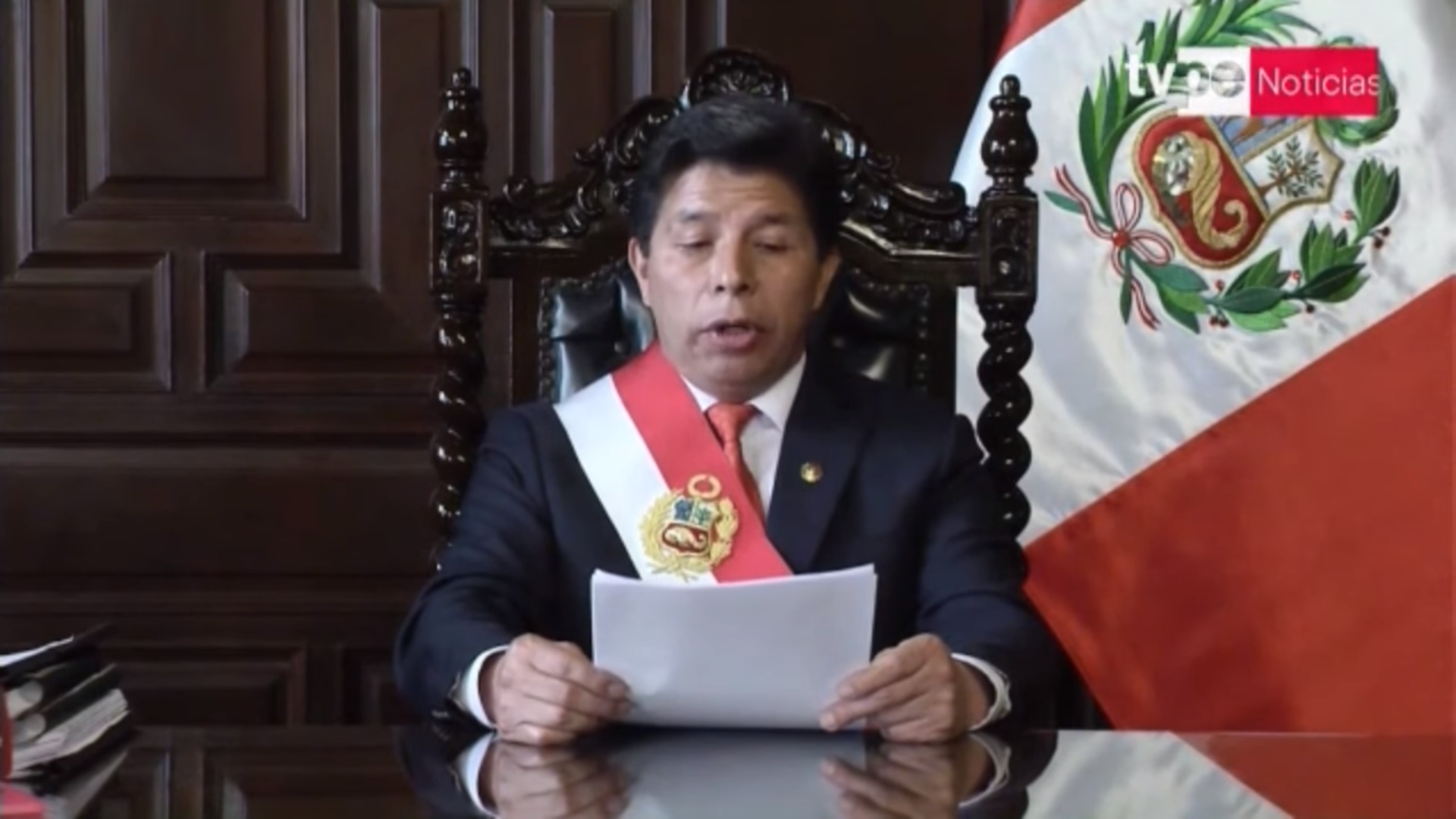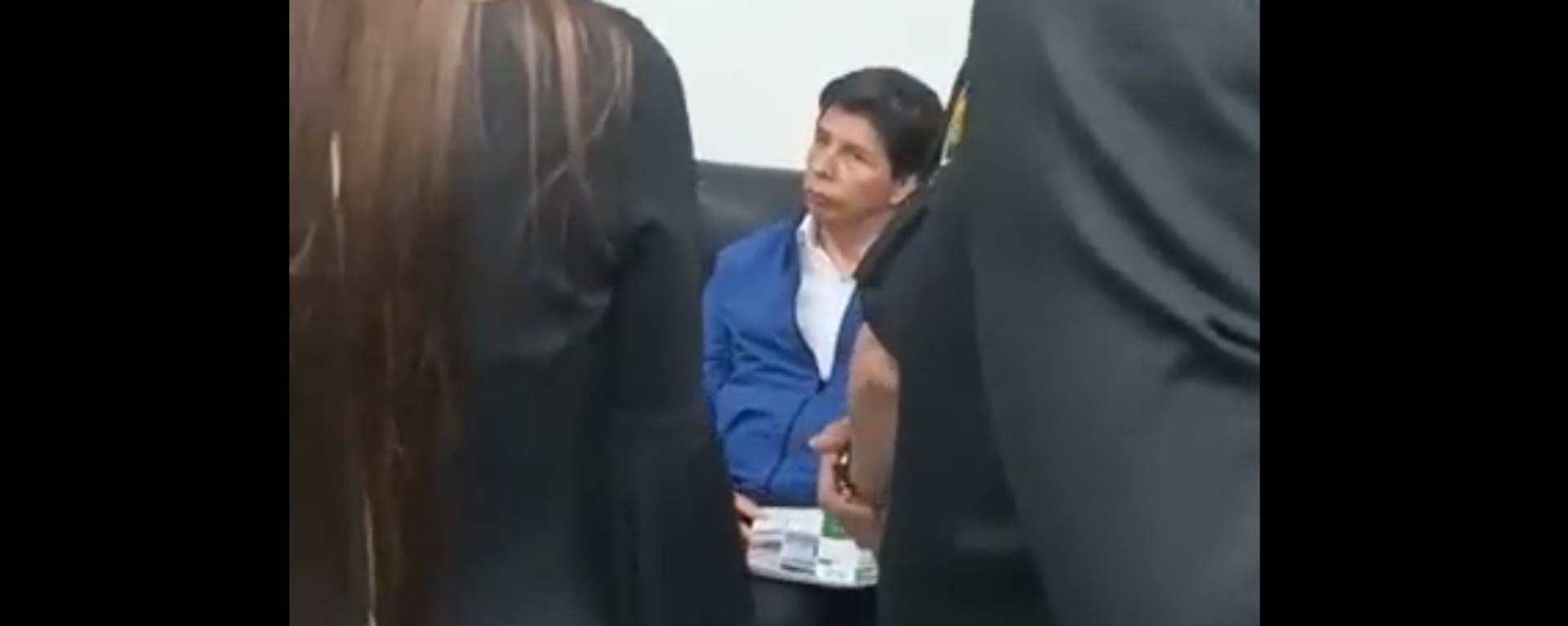Watch Peru’s Castillo Dissolve Congress, Declare Emergency Hours Before Being Impeached in Third Try
19:09 GMT 07.12.2022 (Updated: 17:15 GMT 31.07.2023)
Subscribe
The Wednesday actions of Peruvian President Pedro Castillo have been denounced as a "coup d'etat" and several of his ministers have resigned. Despite being dissolved, Congress voted to from Castillo from office nonetheless.
Peruvian President Pedro Castillo has declared a state of emergency and disbanded the country’s legislature hours ahead of a planned vote to impeach him - the third attempt by the opposition-dominated Congress in the last year.
Speaking in a national broadcast on Wednesday morning, Castillo announced the immediate dissolution of the Congress and the imposition of “an exceptional emergency government” in which he would rule by decree until new elections could be held. A curfew is also in effect.
🚨#URGENTE | El presidente Pedro Castillo anunció el CIERRE DEL CONGRESO. Con él se llevará a cabo el toque de queda desde hoy, a partir de las 10 P.M.#LatinaNoticias pic.twitter.com/kYQhL8dhHE
— Latina Noticias (@Latina_Noticias) December 7, 2022
Castillo also called for elections to a new Constituent Assembly “to prepare a new Constitution within a period not exceeding nine months.”
“As of that date and until the new Congress is established, it will be governed by decree law,” Castillo added.
He also said the justice system, the judiciary, the public ministry, the National Board of Justice, and the Constitution Court would be reorganized.
"The Justice system, the Judiciary, the Public Ministry, the National Board of Justice and the Constitutional Court are declared to be in reorganization," he added.
Following his declaration, several of Castillo’s ministers announced their resignations, including Kurt Borneo, the minister of economy and finance, and Alejandro Salas, the labor minister.
Francisco Morales, the head of the Constitutional Court, called Castillo’s actions a “coup d’etat” and called for his immediate resignation. He appealed to the military to halt the coup.
Castillo’s move came just hours before the Congress was set to vote on whether to impeach him for “moral incapacity,” which would immediately remove him from office. It is the opposition’s third attempt to impeach him since he took office in July 2021.
Despite Castillo's declaration that the body was dissolved, the Peruvian Congress met on Wednesday afternoon anyway and voted to immediately remove him from office.
"Defending our democracy and constitution, the plenary session of Congress gave 101 votes in favor of the resignation of President Pedro Castillo," the Congress said in a statement.
Within hours, Castillo had been detained by Peruvian police, following the rejection of his coup by the armed forces. Vice President Dina Boluarte was summoned by Congress to be sworn in as the new president.
Even before Castillo, a left-wing farmer and school teacher from the country’s mountainous inland, took office, the right-wing forces grouped around powerful financial interests in the capital of Lima had tried to block his election victory. His election rival, Keiko Fujimori, is the daughter of former dictator Alberto Fujimori, who ruled Peru in the 1990s and waged a bloody counterinsurgency against communist forces while pushing through neoliberal reforms that gutted the country’s working class and peasantry.
Since then, the opposition has mounted numerous attempts to frustrate his ability to govern, forcing many ministers to resign and attempting to impeach Castillo several times. Recently, Castillo appointed his fifth prime minister.
In April 2022, on the wake of a failed second impeachment attempt and amid massive demonstrations said to have been coopted by the opposition, Castillo also declared a state of emergency. That impeachment was also for “moral incapacity.”
Last month also saw large demonstrations calling for Castillo’s ouster, causing him to appeal to the Organization of American States (OAS) for mediation. The international body called for “a cessation of political strife” between the executive and the legislature “in order to start governing for Peruvian society.”



